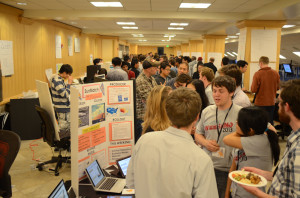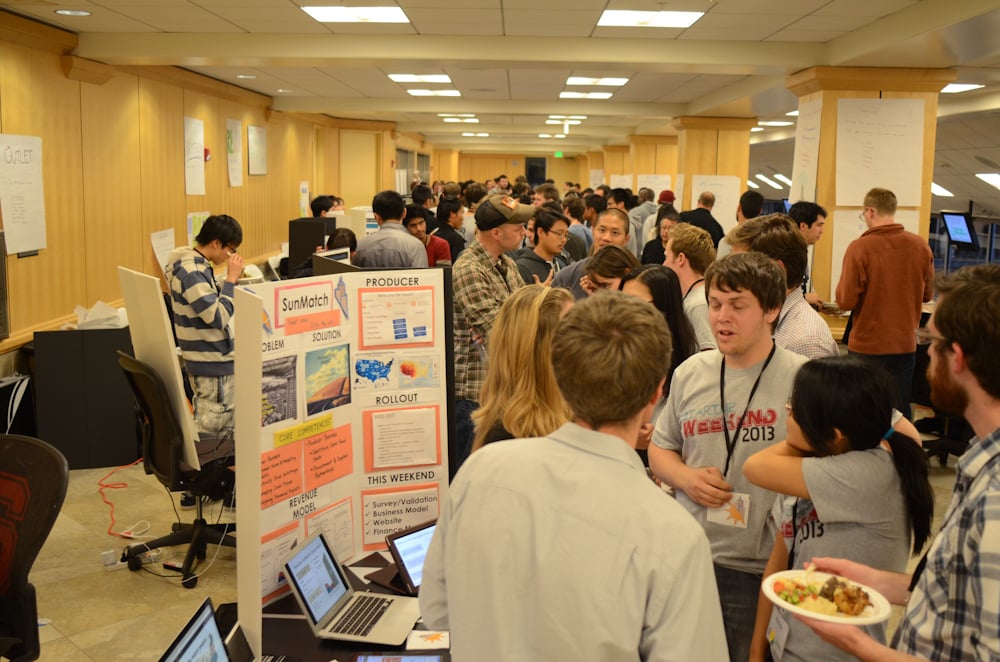In an atmosphere fueled by caffeine and late night pancakes, participants of this year’s Stanford Startup Weekend were challenged to push their limits.

“Your job is to make yourselves a little bit uncomfortable all weekend,” said Startup Weekend coordinator Annette Zinky.
From Nov. 1 to 3, more than 100 students gathered in the Stanford Stadium Skybox to participate in the second annual Startup Weekend. Student entrepreneurs with a wide variety of skill sets worked for 54 hours in small teams to create business plans and projects to pitch to a panel of judges on Sunday night.
Organizers agreed that, compared to last year, this year’s companies were both more viable and more diverse.
This year’s winning team was Dispatcher, a company whose slogan was “Uber for long-haul trucking,” referring to the startup Uber that uses an app to connect riders and drivers. Dispatcher itself aims to use mobile coordination to increase the efficiency of load-order matching between truckers and shippers, therefore cutting out unreliable brokers.
“Everybody worked extremely hard,” said A.J. Balance ‘09 MBA ‘15, one of Dispatcher’s 11 team members. “We had multiple groups doing multiple things at one time all weekend: talking to customers, hacking out a design and a brand, building products.”
The six judges evaluated teams based on their business model, customer validation and execution. Final pitches were limited to one minute, and judges then visited teams’ tables to learn more about their companies.
“I have to put my VC hat on and think of the presentations the same way I would think of any company that comes and pitches to us,” said judge John Lee ‘89, a vice president at Silicon Valley Bank’s Entrepreneur Services Group. “It’s all about the idea, the product, the team and the market that they’re addressing.”
Andrew Scheuermann, a third-year Stanford doctoral student in materials sciences and engineering and a Startup Weekend organizer, stressed how forming a company, especially over a weekend, is an ambitious task by design.
“The chance that you get all the pieces together in a single weekend is relatively low,” Scheuermann said. “We want [Startup Weekend participants] to have an incredible educational experience—to learn what it’s like to walk through the lean startup methodology of doing customer iteration, need-finding.”
Planning for the event began three months in advance, Scheuermann added.
The weekend kicked off with keynote speaker Keith Rabois ‘91, an entrepreneur and angel investor at Khosla Ventures with a colorful history at Stanford. Participants then had the chance to pitch potential products or problems to solve, and students self-assembled into teams around the ideas that appealed to them.
By Saturday afternoon, 18 projects werein full swing. Mentors met with teams in the morning as they continued to develop their products and services. Many of the mentors came from high-powered sponsors spanning a range of entrepreneurial fields, like Microsoft in technology and Silicon Valley Bank in financial services.
Alice Wu, a third-year Stanford doctoral student in mechanical engineering, explained how her idea for BackTrack, a mobile app that allowed parents to locate their children through tracking devices at busy locations like amusement parks, took off unexpectedly.
“I came here with not really any expectations and not even expecting to pitch, but I pitched my idea yesterday, and we got a team together,” Wu said. “Our goal is to put together a functional prototype to test at the football game next weekend.”
Late on Saturday night, another company, Hedwig, was working on creating a campus delivery service for food and other goods using flying drones.
“If you need food or something on campus,you can call a quadcopter, a small drone, and it will fly the food or whatever you need to your location,” Kotynek said.
Team member and Knight Fellow Martin Kotynek spoke about the long hours that have become the norm for entrepreneurs in these intense environments. Participants were acutely aware of the role startups played in their everyday lives with DoorDash andXumma Cola—both Stanford-affiliated companies—catering the event.
With an emphasis on networking, Startup Weekend brought together many students with different backgrounds and experiences.
Startup Weekend organizer and President of Stanford Women in Business Lauryn Isford ‘15 explained that the younger demographic of undergraduates brings excitement and energy to the event, while graduate students often have the experience and fieldwork to move the startups forward.
Scheuermann explained that the graduate students made up the majority of participants. The entire undergraduate population at the event was about the same size as the number of graduate students in each of the different skillset fields—hardware, software, design, legal, marketing and business.
Mario Chris ‘17 spoke about being on the only all-undergraduate team, consisting of five freshmen and one senior. Although they did not receive an award this year, Chris explained that learning was the most important part of his experience, not winning.
“I learned a lot of new things, and I think that was the best part of it all,” Chris said. “[Being] a team of just undergraduates compared to all the graduate teams…made us want to work harder because it felt really encouraging to know that we were working on the level of several graduate teams that were years ahead of us in experience.”
Contact Kylie Jue at [email protected]
